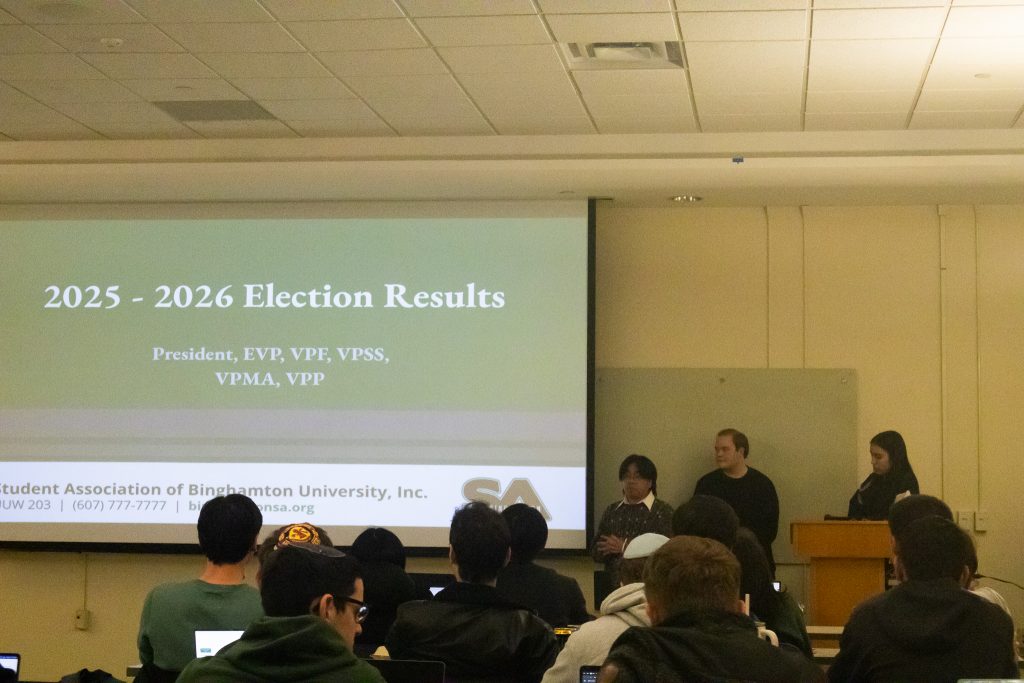The Student Association Congress tabled certification for two races in the 2025 campuswide election at a meeting on Tuesday. The decision came after concerns were raised about the electoral processes of the election’s two closest races: executive vice president and University Council representative.
“After a period of deliberation on the matter, a majority of the representatives ultimately decided to table the certification of the EVP and BU Council Representative positions,” wrote Brady Lindsey, a freshman majoring in physics confirmed as the SA Congress’ parliamentarian just before the certification vote. “The guiding principle under which the discussion period transpired was ‘caution,’ for representatives recognized that the election results for these particular positions were so close.”
“The Student Association Congress is proceeding with careful consideration of these matters to ensure that its members can properly represent the wills of their constituents,” he continued. “I can assure you that I will do everything in my power to collaborate with the Speaker to ensure a fair, timely decision that will be effectively communicated.”
Before leaving the room with the rest of the candidates to await the certification vote, Nick Ginsberg, a candidate in the EVP contest and junior double-majoring in political science and sociology, requested that Congress wait to certify the results. His opponent, Batia Rabin, the incumbent and a junior double-majoring in philosophy, politics and law and women, gender and sexuality studies, won the race by less than two percentage points, according to unofficial results made public on Monday.
Ginsberg said he had a pending grievance before the SA’s Judicial Board, which he filed after a conversation with Kenny Tran, the Elections and Judiciary Committee chair and a senior majoring in biology. Tran informed him that there was not a second-choice option for write-ins and “no confidence” votes, meaning such votes for himself or his opponent were not counted, he alleged.
“That left 166 voters potentially disenfranchised if they selected candidates in the second and/or third rounds of voting, which in most races would have no effect on the outcome,” Ginsberg wrote to Pipe Dream. “However, due to the 34 vote difference between myself and my opponent, I am confident that Congress wants all votes properly accounted for prior to certification.”
The Judicial Board and Rabin declined to return a request for comment. After more than 30 minutes of discussion, a motion to table the certification vote to the next Congress meeting passed in a 26-to-2 vote.
Mackenzie Cooper, who lost the race for council representative by 36 votes according to the unofficial results, addressed the room after Ginsberg, saying that the race’s administration was confusing and “mostly unfair,” with her opponent’s eligibility questioned. She said that on the day of the candidate debate, she received an early email informing her that her Irene Cui, a sophomore majoring in economics, had been restored to the ballot.
She said that she did not intend to contest the “democratically achieved results” but wanted to acknowledge and address procedural errors.
Cooper, a junior majoring in politics, philosophy and law, said that there was a period when she was not allowed to campaign on Election Day because of “administrative issues.” She said she had received an email, along with other Graduate Student Organization candidates, warning them that if they continued campaigning, they would be disqualified. Cooper questioned whether this lost time impacted her performance in the race.
Ademola Adedoyin, the GSO’s chief elections officer and a Ph.D. student studying industrial and systems engineering, told Pipe Dream that there was a discrepancy in the SA and GSO guidelines, as GSO candidates are not allowed to campaign on Election Day, but SA candidates are. He said Tran had reached out to see how to proceed with the candidates for University Council representative and that they decided to allow them to campaign.
Adedoyin said that he sent a reminder to every candidate on how to conduct themselves and added that he wouldn’t frame it as an administrative issue.
Cooper said that she had filed a complaint with the Joint Elections Committee before winners were announced, alleging defamatory statements made about her.
“Beyond the administrative failures of this election, I have been subjected to disgusting discriminatory comments from multiple students and even an SA-chartered organization,” Cooper wrote. “Unlike any other candidate on the ballot this year — or any candidate I can recall during my time in the Student Association — I have been publicly criticized and discriminated against for my identity and personal beliefs, which have no bearing on how I have carried out my role over the past year.”
“I have begun taking action on this and will ensure that my voice is heard,” she added. “I deeply appreciate the congressional representatives who have voted to make sure that happens.”
Congress representatives also discussed a formatting issue with the ballot in the early hours of Election Day, leading it to be closed for a short time. Tran said that while any prior submissions had to be resubmitted, he sent an email informing affected voters. Election Day was extended by an hour to accommodate this issue, and Tran said that he didn’t think the few who chose not to resubmit impacted the election results.
The results for vice president for finance, vice president for student success, vice president for multicultural affairs and vice president for programming were certified by Congress at the Tuesday meeting.



